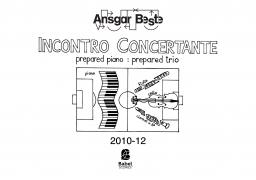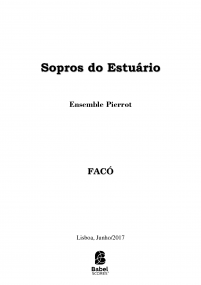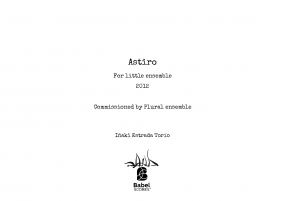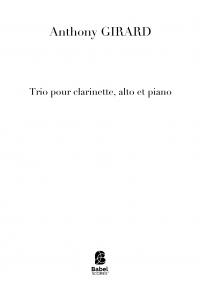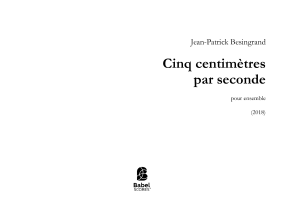Il dardo di Apollo
8,24 €
Version papier (+14,80 € impression et livraison ). Colissimo7-14 days aprox.
Version numérique (+0,00 €) à télécharger
Chez BabelScores, quand vous achetez une partition, vous pouvez ensuite contacter directement le compositeur ici même !
Caractéristiques
Region
Europe
Estimated Duration
1 - 5min
Date
2009
ISMN : 979-0-2325-0202-1
In Stock
Notes sur cette pièce I have been asked many times why our music creates unease in listeners.
I think it is because it embodies existence itself through its representation of the anguish of the unforeseeable.
This music is the epiphany of Apollonian.
Giulio Colangelo
Apollo’s dart
Since the dawn of time humanity has roamed like a beggar seeking life’s meaning : History is this.
The unknowing wayfarer finds immense pleasure in the comforts of a journey’s end, unaware that he is no real traveller and his destination is ephemeral.
Humanity has reached heights of knowledge without this meaning but at the same time its absence has led to eternal torment.
The Greeks knew this. Perpetual suffering is intolerable for man. Its alleviation needed the crystallization of the chaos.
Thus came about “Apollo Loxos”2 whose tongue was far from human speech.
“The Lord whose oracle is at Delphi neither speaks nor conceals, but gives signs”3.
Man is not tormented by Evil or by Good: he is tortured by the indefinite.
Apollo ruptures human praxis with his arrows from afar, their alien power overcoming human nature.
He symbolizes Being that suspends becoming in the very instant the dart tears the flesh.
Pain, humanity’s essence, forces man to struggle with his own self, to suspend his outward gaze and to turn it inward.
It is a different element insofar as it identifies the unknown within ourselves.
Humanity needs to give a form to the indefinite.
God has to shoot the dart, man has to stem the wound.
Angelo Tavolaro
* The main source of this work is : G. Colli, La sapienza greca, vol. I, Milano, 1977
Ajouter à une playlist
- Identifiez-vous pour créer une liste
I think it is because it embodies existence itself through its representation of the anguish of the unforeseeable.
This music is the epiphany of Apollonian.
Giulio Colangelo
Apollo’s dart
Since the dawn of time humanity has roamed like a beggar seeking life’s meaning : History is this.
The unknowing wayfarer finds immense pleasure in the comforts of a journey’s end, unaware that he is no real traveller and his destination is ephemeral.
Humanity has reached heights of knowledge without this meaning but at the same time its absence has led to eternal torment.
The Greeks knew this. Perpetual suffering is intolerable for man. Its alleviation needed the crystallization of the chaos.
Thus came about “Apollo Loxos”2 whose tongue was far from human speech.
“The Lord whose oracle is at Delphi neither speaks nor conceals, but gives signs”3.
Man is not tormented by Evil or by Good: he is tortured by the indefinite.
Apollo ruptures human praxis with his arrows from afar, their alien power overcoming human nature.
He symbolizes Being that suspends becoming in the very instant the dart tears the flesh.
Pain, humanity’s essence, forces man to struggle with his own self, to suspend his outward gaze and to turn it inward.
It is a different element insofar as it identifies the unknown within ourselves.
Humanity needs to give a form to the indefinite.
God has to shoot the dart, man has to stem the wound.
Angelo Tavolaro
* The main source of this work is : G. Colli, La sapienza greca, vol. I, Milano, 1977
Instrumentation
Clarinet|Piano|
Score Details
Format - A4 / US Letter
Pages - 21
Pages - 21

.png)
 4_285x285.png)
 5_285x285.png)


